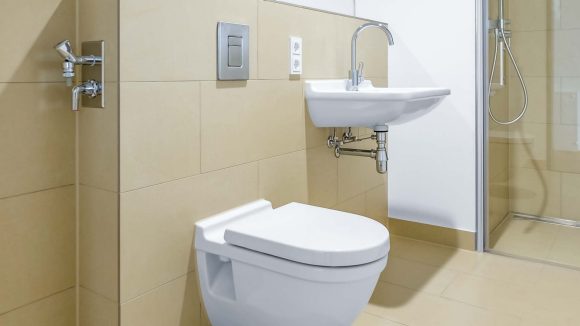
Before starting a renovation, all parts of the house, including the roof, facade, heating system, supporting structure, pipes and wiring should be thoroughly checked. It is important to be aware of the potential risks and protect against them as far as possible. Even experts cannot always predict the costs with 100 % certainty, however. Architect contracts commonly allow for cost deviations of +/–25 % for preliminary projects, for example. The architect’s cost estimate, which is based on a clear description of the planned work, is more binding. A tolerance margin of +/–10 % is usual here.
Arrange the financing
Arrange the financing
The rule of thumb in practice is: Smaller conversion or renovation projects – such as bathroom or kitchen – can be financed directly by increasing the mortgage. For larger more comprehensive projects, such as a complete refurbishment, construction financing is required.
In this case, the bank sets up a special construction account, which is used to process all payments for craftsmen, planners, suppliers, etc. The client advisor responsible releases payments for invoices that correspond to the work mandate, have been approved by the architect or building trustee and are countersigned by the client. In order to increase a mortgage or qualify for construction financing, financial affordability requirements must be met.
Arm yourself against surprises
Arm yourself against surprises
- Work with the right partner: You should consult experienced building partners and planners, especially for demanding renovations. In addition to good references, it is important that potential partners are able to demonstrate that they have experience with similar building projects.
- Define the mandate: As the client, you commission contractors, whether on a contractual basis or through agreements for work and services. You must precisely define the planned services by means of service descriptions that include clear objectives, work stages where appropriate and a fixed cost ceiling.
- Calculating the costs: With smaller renovations such as painting or a kitchen conversion, the costs are relatively easy to estimate and budget. Not so with larger projects, which can quickly become very expensive: a total renovation or conversion of an older house – all rooms plus roof, facade and heating – can easily cost 30 to 40% of the building insurance value.
- Reserves: Define the financing framework in such a way that there is scope to cover unexpected developments or wishes that arise in the course of the project.
- Budget overruns: When costs escalate, it is often due to changes that the client requests. Operating on a “rolling planning” basis is one of the biggest mistakes that can be made: the craftsmen are already at work and the client repeatedly asks for changes and extras. Deviations from the cost estimate are as good as preprogrammed then.
- Cost monitoring: Make sure that a planner, the architect or an independent trustee plans and monitors the costs for you.
- Construction defects: Under the law and common SIA standards, contractors are liable for the proper performance of their work. Deciding whether something is actually a defect or shortcoming depends in detail on the contract and the concrete circumstances. Every craftsman is obliged to work according to the state of the art and recognized codes of building practice. The quality standards are defined in the SIA standards. Important: Defects and shortcomings must be recorded at the time of handover or a written complaint must be subsequently made.
- Guarantees: Under the Code of Obligations, a statute of limitations of five years applies to defects in immovable property, such as a house. Household appliances such as refrigerators, dishwashers, etc. are generally guaranteed for a period of two years.

